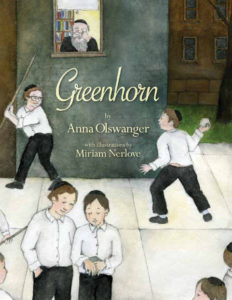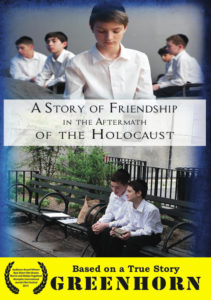An interview by the author of Greenhorn with the director who adapted her book to film
In 2014 I co-produced an independent film adaptation of my middle grade novel Greenhorn, the story of a young Holocaust survivor who arrives at a Brooklyn yeshiva in the 1940s with only a small box that he won’t let out of his sight. The film, like the book, concerns bullying and disabilities and is based on a true story.
The film version of the book premiered in late 2014 at the Landmark NuArt Theatre in L.A. and at The Museum of Tolerance in New York. It was named the 2015 Audience Award Winner for Best Short Film Drama at the Morris and Mollye Fogelman International Jewish Film Festival in Memphis and subsequently aired on public television in Tennessee and Kentucky.
I’ve always wondered what caught the eye of the film’s director Tom Whitus, who wrote the screenplay. Tom is not Jewish and none of his family perished in the Holocaust, so what about the novel made him want to adapt it to film? The following is my short interview with Tom about Greenhorn:
Anna: What first struck you about the book?
Tom: The story is about friendship and loyalty—and standing up to bullies. These are all themes that are as important today as they were in 1946.
Anna: Why did you want to adapt the book to film?
Tom: As much as I respect the power of reading, I knew that the film would give us an opportunity to tell the story on a larger scale. And, since I felt it was important story to tell, I hoped the film would give us a chance to tell the story to a broader audience.
Anna: What did you see as the challenges to filming it?
Tom: The biggest challenge was going to 21st Century New York City to make a film set in 1946. Fortunately, much of New York has architecture of that period, so it was just a matter of framing out all the signs of a modern city. Casting was a challenge as well, finding the boys brought up in a modern world who could look and act like the yeshiva students of 1946. We found some very talented actors to bring those roles to life.
Anna: Are you satisfied with the end result?
Tom: Yes—with this caveat. Whenever I watch the film, I always come across a scene where I say, “I could have done that better.” Still, given our constraints, I think we made a very nice film.
Anna: What do you think the film achieves that the book couldn’t?
Tom: As I said before, I think it reaches a broader audience. There are people out there who will watch the film but might not ever take the time to read the book (though I honestly think you can read the book in less time than it takes to watch the film). That said, the film brings the characters to life.
Anna: Do you think the film is important?
Tom: This is a very important film for many reasons: It is imperative that we remember the Holocaust and the toll it took; we need to remember and mourn the victims of the Holocaust and celebrate those who survived to tell the story; friendship and loyalty can overcome small minded people; and finally, those who are different—those who stutter, those who suffer from tragedy—need to be accepted and loved, not shunned and made fun of.
Anna: Why do you think young people should see the film?
Tom: I think it will help them understand what others have gone through, and how friendship, loyalty and bravery can change the world.
Anna Olswanger is the author of Greenhorn and Shlemiel Crooks, a Sydney Taylor Honor Book and PJ Library Book. She has been a literary agent since 2005 and lives in the metro NYC area. Visit her online at www.olswanger.com. Greenhorn was published in 2012 by NewSouth Books in hardcover and ebook.
Karen Cushman, Newbery Medalist, called the novel “a tender, touching celebration of friendship, family, and faith.” David Adler, winner of the Boston Globe-Horn Book Honor Book for Nonfiction, called it “a heartwarming and heartrending story of friendship and tragedy.”
As an aid to teachers and librarians, the publisher NewSouth posted a Classroom Guide for the book on its website: http://www.newsouthbooks.com/greenhorn/greenhorn-classroom-guide.pdf
The guide has curriculum tie-ins to the Holocaust, Judaism, World War II, Heroes and Heroines, U.S. and New York History, World History, Historical Fiction, Friendship, Community, and Family.
TMW Media distributes the film version of Greenhorn and has posted a discussion guide for the film online at www.tmwmedia.com/newtmw/teachers_guides/L4812DVD.pdf.
You can view the film’s trailer at www.youtube.com/watch?v=pNo5tx3q_3c.
Greenhorn is an important film and book, so thank you to Anna and Tom for sharing it with us! Also, what a fascinating process to learn about!



